#translation notes
Text
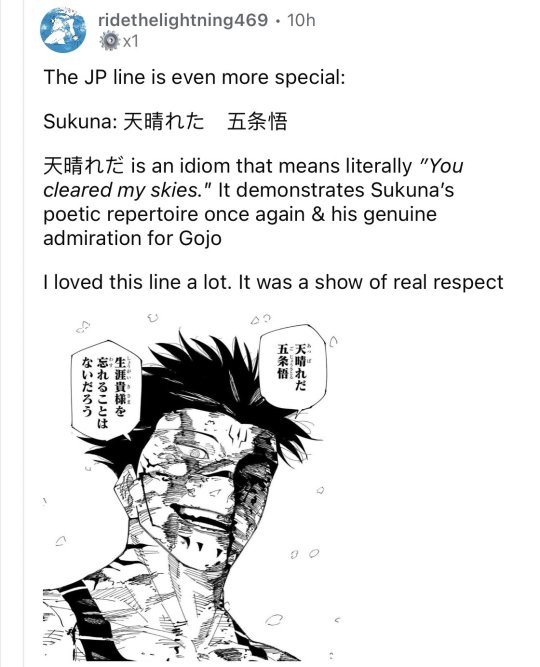
Is it possible to love a character more than you already do? SOBBING because so many intricate details important for Sukuna's characterization gets lost in translation and lightning is an amazing person for bringing this to our attention (go follow them on their platforms ;_; They deserve it so much)
Sukuna's use of words are honestly so poetic and romantic, there is a certain grace and elegance with the way he presents himself, no doubt like a king. It may seem like he's a hot-headed maniac, but he's clever, cunning and intelligent. He knows when to let loose and when to reign himself in.
"You cleared my skies" I would literally melt at the spot, :') aaahhh I'm glad both of them ended up acknowledging one another, this really hits you right in the feels.
#Ryomen Sukuna#Sukuna#satoru gojo#gojo satoru#jjk#jjk manga#jujutsu kaisen#jjk 236#translation notes#hey if you can it would be really nice if you followed lightning on their various platforms since they could really use the support#lately they went through a difficult problem on twitter so it is a bit more challenging to see their translation notes#but they really do help us in understanding JJK better and see it for what Gege has intended it as#jjk spoilers
2K notes
·
View notes
Text
translation notes on deleted lines + why translation is truly so important
[long post]
Hello everyone... As I'm sure you've seen, the deleted lines here that were leaked have been a wrecking ball on both this fanbase and my heart!!! (thank you to the users who put that together.)
OKOKOK more translation notes!!! This is a little too out of my level in Korean for me tbh, but I'll try my best to explain my point of view.
기억은 없지만 저 역시 당신의 아들임니다.
I may not remember, but I'm still your son.
Pino is using the form Dangshin (당신) here and not father (as in 기억은 없지만 저 역시 아버지의 아들입니다?), probably because he isn't directly talking to Geppetto, and it's a general formal version of "you".
Grammatical notes aside and getting to the main point, this line shows that translation is SO finicky and SO important
This line is such a completely crazy example of how translation can change an entire story; how one word can make something entirely different.
Let's look at that line with the two different interpretations.
기억은 없지만 저 역시 당신의 아들입니다.
I may not remember, but I'm still your son.
Alternatively, where 역시 (yeokshi) is interpreted as "TOO":
기억은 없지만 저 역시 당신의 아들입니다.
I may not have [his] memories, but I'm your son, too.
Here's the thing... "but I'm still your son, too"...
that "too" changes EVERYTHING. That little three letter word, at the end of that sentence changes everything, and has the power to steer an entire story. Because why would he need to add the "too" modifier if Geppetto only had one single child?
At my level, I cannot say that it's one or the other with 100% certainty. Translation always requires some form of interpretation, and either one is "accurate". But, as you know, a translation being "accurate" is often not even enough. [note: In the process of writing this post, and giving it some thought. I would say that yes, considering the context, the second translation is more accurate (because in this context he is referring to Carlo's memories when he uses the word "역시") ]
Deleted lines are deleted for a reason
Over the many days I've been deliberating over this (lol Lies has taken me heart and mind), I've realized that maybe I've gotten caught up in a bit of survivorship bias. As in, I think I was focusing on the content of the deleted lines, and not that they were deleted in the first place.
[Among other reasons,]
I think these lines were likely deleted because the (almighty gods) Developers wanted to keep it more ambiguous and up to interpretation whether or not P is Carlo. It's a very intriguing choice. That being said, I really appreciate that people shared this so we can see the creative decisions that were even made in the first place.
I'm reminded of Antonia's letter, because I still find it that profound. (she really was the best ;_;) When she sees Pino, she doesn't mention carlo at all to Pino, lady Antonia just treats him exactly as he is.
And her final letter is so touching. Perhaps guessing what complicated emotions Pino might be feeling about his relation to Carlo.. she tells him, not that he is or isn't Carlo, but that
"Whether you are that child or not -"
he is worthy of love and that he is precious.
"Whether you are Carlo or not, You are precious to me."
Director Choi's message on the Special Release Vinyl:

This is from discogs, the quality is hard to read so I've transcribed this portion here.
Lies of P harbors a plethora of concealed enigmas and artful subtleties, and there are no wrong interpretations to them. Piece together the scattered fragments and unravel the puzzle to craft a narrative of what is true to you.
...
With sincerest regards, Lies of P Director
CHOI JIWON
Seems to directly confirm that some things being left up for interpretation is by design. Very very neat!! I love it!! :)
70 notes
·
View notes
Text
The other day I was rewatching Chishiya's last scene at the hospital, and being the translation nerd that I am, I started focusing on the dialogue choices the Netflix subtitles took. I was a little baffled because some decisions felt a little out of place to me. Now, I only studied Japanese for about three or four years (which is very little when you've got an ideogram-built language in your hands), but I still felt like taking a look at the entire original dialogue. and boy was it interesting.
So I ended up writing an analysis on Chishiya and Niragi's last conversation, comparing the source text (in Japanese) and the Netflix subtitles' target text (in English). I watched using the subtitles without closed captions, so those are what I'm going to be referencing. I then ended up writing my own personal translation of their conversation. Please take note that I'm not an English native and that while fluent in English I might've lost some nuances.
If you're interested in some details of Chishiya's (and/or Niragi's) psychology that I believe got a little lost in the target text, bear with me and let's have a look at their conversation! In the first part I'm going write down both the source text and Netflix's target text (without cc), and in the second part I'm going to examine what those word choices mean and suggest my own personal translation when I feel it necessary. So - here we go!
韮木 / Niragi: 何か / Can I help you? (1)
苣屋 / Chishiya: あなたも心肺停止を体験されたらしいですね / Apparently, your heart stopped as well. (2)
韮木 / Niragi: よく知ってますね / How do you know that? (3)
苣屋 / Chishiya: 俺もだ / It happened to me too. (4)
韮木 / Niragi: 奇遇だな / What a coincidence. (5)
苣屋 / Chishiya: 死にかけたことで、何か変わりました? / Since you almost died, did anything change with you? (6)
韮木 / Niragi: どうかな。まあ、見た目が派手になったくれえだな。そっちは? / I don't know. Well, I guess I look flashier than before. What about you? (7)
苣屋 / Chishiya: 随分とダメな生き方をしてきたから、これからはもう少しマジな生き方ができそうな気がする。そんなところかな / Since I've wasted my life until now, I think I'll be able to live a more useful life from now on. That's about all. (8)
韮木 / Niragi: ろくでもねえ野郎だったのか、お前も / So you were a good-for-nothing jerk too, huh? (9)
苣屋 / Chishiya: まあね / Yeah. (10)
(1) [Lit. Something?] Here we see Niragi initiating a conversation with a stranger using directly the informal speech (known as ため口 tameguchi). It is very uncommon in japanese culture to approach an unknown person without using formal speech, thus this immediately frames his real-world character as someone who's direct and on the defensive. In my opinion, it is better translated with "Need something?", because I'd say it's a bit more aggressive and fits the character portrayal better.
(2) [Lit. Apparently, you happened to experience a cardiopulmonar arrest as well.] The first line coming from real-world Chishiya tells us two very important things about him. The first thing we notice is that he uses very technical, surgical words that definitely come from his medical knowledge: 心肺停止 shinpaiteishi is a complex word, not very much used in informal conversations. I believe that using a simple "your heart stopped" in the target text undermines Chishiya's portrayal as someone who's pretty knowledgeable about medical terms. So what I would do is write directly in the target text "cardiopulmonar arrest". The second thing we notice is the fact that, unlike Niragi, he approaches him using formal speech (known as 丁寧語 teineigo). This kind of talk is the most common and polite way to speak with an unknown person. He even uses the most respectful second-person pronoun, あなた anata, which comes out as quite detached as well.
(3) [Lit. You know that well?] Niragi's line is a direct response to Chishiya's display of medical knowledge. The most curious thing about this line, though, is the fact that Niragi appears to correct himself and use teineigo as well!This seems to be pretty unprecedented for his character, who's previously always been showed as aggressive and as direct as possible. Instead, here he falls in line with his interlocutor's formal speech use and acts polite as well. He's baffled by his vocabulary, sure, but he also replies in an equally respectful way.
(4) [Lit. Me, too.] It's funny, because what we see is a back-and-forth between tameguchi and teineigo: here Chishiya is the one using informal speech. Unfortunately European languages make this type of transition almost impossible to convey, but I think it is curious that after Niragi has adapted to the polite form common between strangers, Chishiya feels that no, perhaps informal speech is what feels more right. It's almost like he seems to acknowledge an unconscious feeling of already knowing that other person in some way.
(5) [Lit. What a fortuitous meeting.] Chishiya's switch seems to have made Niragi subtly more comfortable because he goes back to using tameguchi. Also, while I think "coincidence" is a pretty good translation, it fails to 100% convey the fact that 奇遇 kigū points at the coincidence of meeting someone. It's not simply "what a coincidence we both had a cardiac arrest"; its meaning is more along the lines of "what a coincidence that we both ended up sharing this hospital room". So once again the dialogue implicitly suggests that the two characters have some sort of connection.
(6) [Lit. Since you came close to death, did anything change?] The back-and-forth continues because Chishiya now returns to teineigo. He seems to keep the stranger at arm's length and to feel confused about whether he knows this person or not. Also, Chishiya doesn't ask whether anything changed with Niragi, because what he says is "did anything change at all?". His question is broad, referencing what could a personality trait, a new worldview, or something else entirely.
(7) [Lit. Who knows. Well, my appeareance has probably become more flamboyant. And you?] Some things to notice here as well. First of all, Niragi keeps using tameguchi; his speech pattern is pretty brash, considering the other person is officially a complete stranger who's settled on teineigo. He even uses そっち socchi as a second-person pronoun, which is not aggressive, but definitely feels colloquial. Another word choice I wanted to look at was the term 派手 hade. Now, this made me raise my eyebrows, because according to Weblio's Japanese-to-English dictionary, some of the meanings of this word are "flamboyant", "gay", "showy", "gaudy", "loud". Niragi is essentially comparing himself at the flashy way queer people are known to dress in (especially in Japan, where gay men in particular are still subject to stereotyping as funny and colorful people).
(8) [Lit. Since my way of living has been without purpose until now, I have a feeling that my way of living will be able to be a little more useful from now on. That's about it.] I'll give you three seconds to guess what Chishiya does in this line. Ready? 3, 2, 1... yes, of course he switches to tameguchi again. Once again his instinct must be telling he's got some sort of previous knowledge of this other person, and so he drops teineigo definitely. Moving on, a change that I think is important to apply to the target text is the translation of 気がする ki ga suru. It does not mean "I think" (which is a conscious action we make) and instead conveys the idea of "I have a feeling that", "I feel like" (which portrays a subconscious feeling we can't always explain). Borderland Chishiya had experiences that brought him to a conscious change of heart, but of course Real-life Chishiya doesn't know that, so what he references is a simple sensation he gets.
(9) [Lit. So you too were a worthless asshole.] Tameguchi remains the speech manner through which the conversation is carried. Niragi makes it even more personal because he uses the second-person pronoun お前 omae, which is specifically masculine in use and extremely forward, often used to directly confront the interlocutor. The word 野郎 yarō is one of the few Japanese strong insults and covers a variety of English epithets like "bastard", "son of a bitch", "asshole". Now the nuance may very but I think "jerk" is a little too mild for both the term used and Niragi's usual speech. We also see the use of the adjective ろくでもない rokudemonai, which can mean "good-for-nothing", but also "worthless", "insignificant", "up to no good", "without purpose". Once again, the nuance used here may vary.
(10) [Lit. Well.] Chishiya concludes their conversation with one of the colloquial expressions we see him using during the series, which is non-committal and generic. You could also translate it as "I suppose", "Yeah", "You could say so".
It was very interesting for me to observe how in the space of a few lines the two characters went from using polite speech and respectful pronouns to a way more informal and direct way of speaking, in just a matter of minutes. I also enjoyed seeing Chishiya's medical background making an appeareance in the source text, and his hesitance towards using an informal speech pattern with someone he doesn't remember meeting, but feels like knowing. I think there's a lot here that gets expressed in an implicit manner and in the source text only!
I definitely had a lot of fun writing this analysis, so since I'm kind of in an Alice in Borderland brainrot I may in the future consider observing the translation process of other (more important) scenes. But this was a fun approach to begin with. Thank you for reading if you've come this far!
#alice in borderland#imawa no kuni no arisu#chishiya shuntarou#niragi suguru#chishiya#niragi#alice in borderland meta#translation notes#linguistics#thinking that i may keep on this track and have a look at usagi and arisu's final scene#or i may look at kuina's flashback in the 1.07 episode because i'm interested at how the transgender subject is approached in japanese#or i may you know. get a life. study for my exams. you know the drill#今際の国のアリス
257 notes
·
View notes
Text
So, apparently, thanks to Caleb's typically amazing translations, we didn't get the full context of an important panel.

Credit to HebatuallahAhm1 on twitter who graciously allowed me to post it.
Further notes:

Doing my research I found this information - Ijime is basically continuous physical or psychological aggression towards someone weaker. It's more than just teasing, it's a really severe sort of thing that leads to ijime suicides.
Why is this translation not specific enough? Essentially Dabi isn't saying "I didn't go far enough", he's saying "It [the abuse] wasn't enough."
I want to emphasis what this means. Dabi is acknowledging, laughing even, that revealing his father's abuse wasn't enough. Endeavor, to use our current lexicon, is uncancellable. Showing his own history and relaying his family history of domestic and child abuse wasn't enough to remove Endeavor from his position in society.
It's an incredibly sad panel. And very realistic for those of us who watch #metoo situations end up with no repercussions for very famous people.
1K notes
·
View notes
Text
Seems kinda ??? how the Noahs come back. Wisely came back seemingly through transmigration to a random vagrant's body, not reincarnation. A lot of the old translations use 'reincarnation', which implies the body is reborn from infancy. They may come back all differently, but it seems difficult to translate 転生 (tensei) (transmigration; reincarnation; metempsychosis) without knowing beforehand how Joyd came back.
lc3 chose 'resurrected', Local and Viz (ugh, Viz' translators don't even read DGM) chose 'reincarnated'.
7 notes
·
View notes
Text

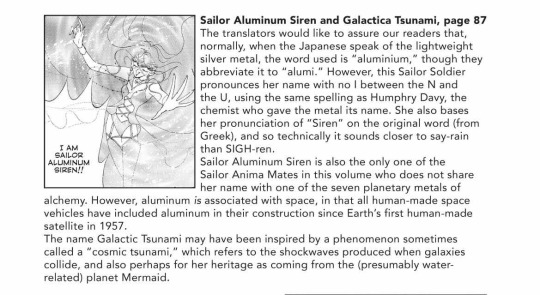

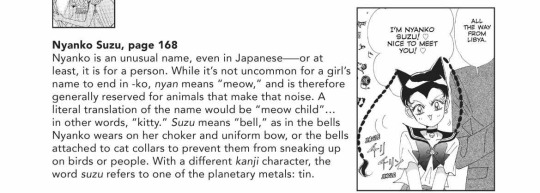

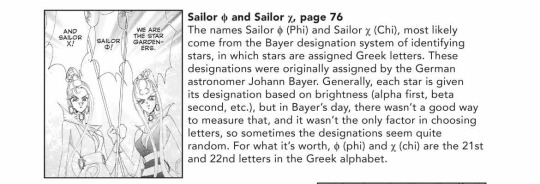
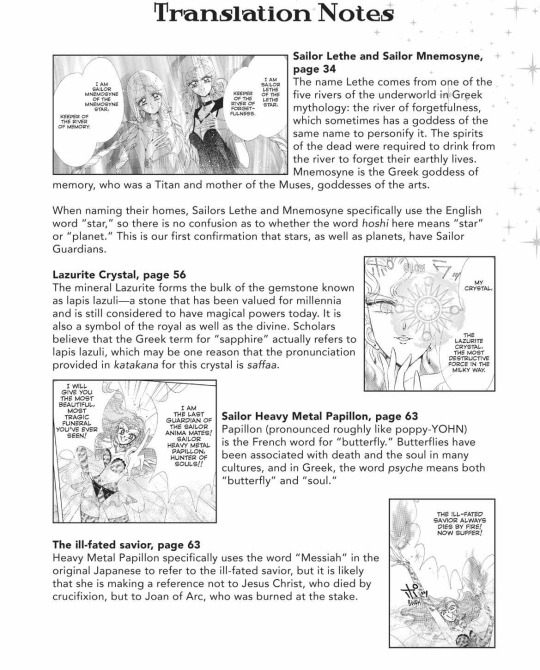
#sailor moon#sailor stars#sailor animamates#sailor iron mouse#sailor aluminum siren#sailor lead crow#sailor tin nyanko#sailor heavy metal papillon#sailor lethe#sailor mnemosyne#sailor chi#sailor phi#sailor galaxia#translation notes#manga#phobos#deimos#sailor coronis
11 notes
·
View notes
Text
Phew, first draft of volume 1 turned in!! I'm so looking forward to once this gets announced and I can actually talk about it!! Hopefully it'll have more readers than the last series I worked on ^^; Especially because we really need to make it to some of the later volumes, like people need to buy it so we can get to at least, like, volume 8!
To celebrate, here's a short list of translation quandaries/thought/notes that would be too stupid to put into print!
’Bowl’ is better but I think it says ’皿’ so we’ll go with ’dish’
When the original says "evolve" but that's not how evolution works
’shitsuke’ is hard to translate
(ahh now I see why my editor was complaining about the apostrophes, they only show up as pointed the wrong direction when I copy-paste them out)
Apparently lay is transitive and lie is intransitive, who knew??
Silly owner! -> Tricks are for kids! (changed it to Stupid owner!)
KIDDEN (I can explain once the series gets announced)
Looking up the difference between sardines and anchovies
"Thanks" with your mouth full: could be "Danks" but that looks too much like "dank" (went with "Fanks")
MC is really great but there are several lines the get borderline creepy if you look at them wrong ("SFXCreep", "Ahh. You smell so clean.")
you KICK Miette?! (but that’s anachronistic to when this first came out ;o;)
Translator’s notes I can’t include: this reminds me of the eromanga days ("I’ll make sure it’s not scary. So relax, okay?")
(Followed by "I’m not blushing. Not blushing!!" It do be like that sometimes)
This series has a lot of one-page gags which is way different than the ones I worked on before, it's kind of nice to have it all condensed like that!
(It took me like, a dozen reads to finally get all the tiny story threads with the art and the jokes I think)
Oh wait I forgot to send this!! "[Page 36: The joke was originally a play on ’hayaoki wa sanmon no toku’, meaning ’there’s benefit to getting up early’, and [character] heard ’sanmon’ as ’salmon’.]"
(Same character) ohhh, [redacted]-yuki, light snow fall; small snow flakes (like her tips)
へーい -> Mmkay.
It's kinda refreshing, I guess, that we see [main character] without a shirt on a lot...?
About さんきゅー: lol I’m gonna says ’thanks’ is okay since it’s in hiragana (and then I changed... and snuck in Purrfect, thanks; that'll probably get changed. There's actually a spot where it says "Perfect" later, but I think changing it would interfere with a joke there.)
Translator’s notes I can’t include: since it doesn’t actually say body horror ("Like body horror?" -> "Like a horror movie.")
Translator’s notes I can’t include: ("don't make up a man to get mad at" -> "Don’t judge what you don’t know!")
thank goodness for Katekyo Hitman Reborn so I know what a 仮定教師 is
There's a panel that just says マーキング that kinda squicks me out for some reason.
doesn’t specify which meal but, dinner? could be both…? ("今日のご飯なぁに?" -> "Yuya, what are we having today?")
SANMA SAURY
oh same problem here actually, it’s not necessarily rice… (ご飯)
[character name] is named after another character I like from Ajin and acts like another character from D.Gray-man, so those influenced my first draft, but I think I have a solid enough grasp on his own character now after reading up to volume 10
see ’picked you up’ really doesn’t work here (for 拾う, because it means 'took in', but it could get confused with 'lifted off the ground')
too sexy for his shirt
if boku is uke and 俺 is seme, is オレ switch? >>
[main character] really doesn’t strike me as someone who’d say ’Tch’??!! -> "Got me."
oh, cat fight, I hadn’t noticed (I get so focused on the words sometimes it takes me way longer than it should to notice the art)
meager? flimsy? sparse? skimpy? paltry? *scant?
Translator’s notes I can’t include: also now it’s a sneaky Ajin reference (right?) OH that's why I wanted 'play ball' and not 'play catch'... (it did get changed to 'play catch' as of now)
LOTR potato song
just realized [character's name] looks like [redacted] Street
"ass backwards" would be really funny too (went with "Do you two know the phrase ‘cart before the horse’?)
Things on Walmart are called ’senbei’ so that means I can use 'senbei' too right
we were just doing this to Panda (scaring my friend's cat and her tail puffed up)
OMg the jisho example sentence for gikuri…
圭はその問いにギクリとさせられたが、頭を何でもないといいたそうに横に振る。
[redacted] is startled by that question, but shakes her head as it to say that it’s nothing
two very conflicting purposes for this line: not revealing [redacted]'s gender, and also conveying what the line means >>
not to mention it's about おっぱい and this isn't that kind of manga
I mean I guess we could just say 'buns' (instead of dango) but since we're launching directly into Otsukimi that seems unfair to the reader
(It was really funny how frequently things I was doing irl overlapped with what was happening in the manga as I worked on it! Christmas, mochi, snow, cats being cute...)
hey their names all use different writing systems
もみもみ-> knead knead, directly followed by こねこね→knead knead
"Super" seems too girly for [redacted female character]?
"You know, in other countries, they say a lion lived there [on the moon]." I swear I searched for at least half an hour and I cannot figure out what this is talking about. Hopefully someone else can figure it out.
oh like the wood getting in the mochi?? (from the thing you pound the mochi in, we had just been talking about that)
"The moon’s so pretty." -> I love you?
"now I’m translating and I don’t want to get up bc of the cats…"
Staying with my host sister in Tokyo-Chiba gave me perspective on what really counts as ’inaka’ LOL
I probably posted about this already, but over the 2.5 months of translating this, I've become hyper-aware of dekopons. They're everywhere! Even in the U.S.! Trader Joe's just featured them in their latest flyer!!
Translator’s notes I can’t include: deception by orange: ("OK BUT THEY HAVEN’T EXPLAINED THIS YET… god am I going to be sucked into ANOTHER red herring about oranges XnX" -> after Code Geass many moons ago)
"ああしてるとやっぱ男の子だな" -> "Boys will be boys." I dislike this line but I feel like this is an okay solution…? except [main character] isn’t like that XD is that making a new point? I mean I guess what he said in JP would be making the same point… < ah that’s funny because [main character] is supposed to be (speaking?) more feminine
"やっぱユーヤはかっこいいね" -> "You're handsome." this feels like a huge stretch but also supremely in prince [redacted] character?? like she says it offhand. okay well the first word on jisho for kakko ii is ’attractive’, so maybe handsome works? I still think this is the right choice
Tara-> cod means you get poetry like "I think we’ll do hot pot with cod for dinner."
Translator’s notes I can’t include: moyashi (?) ! (like D.Gray-man) -> string bean
is that too SpyxFamily? -> Borf (from わふん) (Went with WORF) (I did borrow "shock" for ガン though)
I thought it sounded dumb but I’m getting attached to it… ("Alarm of cuteness blast")
uptight? careful? particular? mindful? cautious…
Translator’s notes I can’t include: Knitting doesn’t work that way. Also even if it does, the clothes would look more knitted...
仕事、おつかれさま -> "We know you worked hard today." is this what gets me cancelled
最高気温10度 well actually that one works both ways XD XD XD whether it's Celsius or Fahrenheit, 10 degrees is still cold!!!
I don't think the book they're reading about Santa is any existing book in particular
"I’m not a kind" oops -> "I'm not a kid" (silly typo)
"It’s no fun receiving without giving in return." "Prepare yourself!!" (this is about presents, but... is that too sexual or am I just a bad person? it’s fine. bad person confirmed)
lol that puts "Roger!" in two of my series too
Heh sounds too lecherous but hmph sounds too dispassionate…
I really should be writing this 100% in caps all the time huh (since manga is usually lettered in all caps, it might be better to have an idea of what it might look like)
#translation notes#too silly to print#thoughts#original#part 2 coming#apparently there's a character limit
2 notes
·
View notes
Text
Translation Notes, Part 2
Mod Blue: After I saw @mysticalspiders contemplate whether the original translation of Twenty Thousand Leagues is less homoerotic, I decided to check for myself, and then I spiraled out of control and decided to use this post as a means of doing what I love to do: screaming about the differences between Mercier's original translation, and the Walter translation we're reading now.
I don't have the greatest eye for what is and what isn't considered romantic/erotic, but I figured Aronnax's physical description of Nemo was a good place to start. Here's an excerpt from Walter's translation:
"Without hesitation, I identified his dominant qualities-- self-confidence, since his head reared like a nobleman's above the arc formed by the lines of his shoulders, and his black eyes gazed with icy assurance; calmness, since his skin, pale rather than ruddy, indicated tranquility of blood; energy, shown by the swiftly knitting muscles of his brow; and finally courage, since his deep breathing denotes tremendous reserves of vitality."
Here's how Mercier translates the same passage:
"I made out his prevailing qualities directly: self-confidence-- because his head was well-set on his shoulders, and his black eyes looked around with cold assurance; calmness-- for his skin, rather pale, showed his coolness of blood; energy-- evinced by the rapid contraction of his lofty brows; and courage-- because his deep breathing denoted great power of lungs."
Leaving aside all the pseuoscience... I think it's still clear in Mercier's translation that Aronnax is captivated by Nemo, but the language isn't quite as rich (in my opinion) and is a bit more impersonal- Nemo's head "rearing like a nobleman" paints a much more compelling picture than merely being "well-set on his shoulders," and the "swiftly knitting muscles of his brow" is (to me) more physical and visceral than the "rapid contraction of his lofty brows." Still, this isn't all that different.
The differences led me to wonder which translation is truer to Verne's text, so I'll refer to it here:
"Je reconnus sans hésiter ses qualités dominantes - la confiance en lui, car sa tête se dégageait noblement sur l'arc formé par la ligne de ses épaules, et ses yeux noirs regardaient avec une froide assurance : - le calme, car sa peau, pâle plutôt que colorée, annonçait la tranquillité du sang ; - l'énergie, que démontrait la rapide contraction de ses muscles sourciliers ; le courage enfin, car sa vaste respiration dénotait une grande expansion vitale."
Google's word-for-word translation is as follows:
"I recognized without hesitation his dominant qualities - self-confidence, for his head stood out nobly on the arc formed by the line of his shoulders, and his black eyes gazed with cold assurance: - calmness, for his skin, pale rather than colored, announced the tranquility of blood; - energy, demonstrated by the rapid contraction of his eyebrow muscles; finally courage, for his vast breathing denoted a great vital expansion."
It seems Mercier was truer to the text with the "rapid contraction" line, but Walter hit the mark in the description of how Nemo's head rises above his shoulders (expanding on "nobly" to mean "like a nobleman"). And he also chose some more fanciful, descriptive synonyms that aren't present in the French language- "ruddy" for "colored/colorée," "swiftly knitting" for "rapid contraction/rapide contraction," "tremendous" for "great/grand."
Walter also restores two paragraphs following this passage which Mercier excised from his translation. These talk about the "harmony of [Nemo's] facial expressions" ("de l'homogénéité des expressions dans les gestes du corps et du visage") and how Aronnax felt "'involuntarily reassured'" in his presence ("Je me sentis « involontairement » rassuré en sa présence"). To that last line, I say- ooh la la. Shame Mercier cut it... (I would also like to know why "involuntarily reassured" is in quotes- is it referring to something that audiences at the time would have been familiar with?)
Also in Walter's translation, Aronnax describes Nemo as "the most wonderful physical specimen I had ever encountered." Now that's homoerotic if anything ever was. In Mercier's translation, Aronnax still seem attracted, but perhaps slightly less dazzled: "This man was certainly the most admirable specimen I had ever met." Verne's original is a bit closer to Mercier's, as far as I can tell: "Cet homme formait certainement le plus admirable type que j'eusse jamais rencontré" (as translated by Google: "This man was certainly the most admirable type I had ever met"). (I now ask if any native French speakers/anyone who didn't just take two years of Duolingo lessons before getting frustrated and giving up, like I did, can chime in on whether these translations I'm getting from Google are accurate or not.)
Finally, here's an excerpt from Walter's translation where Aronnax gushes over Nemo's eyes:
"When this stranger focused his gaze on an object, his eyebrow lines gathered into a frown, his heavy eyelids closed around his pupils to contract his huge field of vision, and he looked! What a look- as if he could magnify objects shrinking into the distance; as if he could probe your very soul; as if he could pierce those sheets of water so opaque to our eyes and scan the deepest seas...!"
To me, this reads very much as "ooh, Aronnax's got a crush." Meanwhile, Aronnax's thoughts are more subdued in Mercier's translation:
"When this stranger fixed upon an object, his eyebrows met, his large eyelids closed around so as to contract the range of his vision, and he looked as if he magnified the objects lessened by the distance, as if he pierced those sheets of water so opaque to our eyes, and as if he read the very depths of the seas."
One line seemed notably omitted here: what about Nemo "prob[ing] your very soul?!" Naturally I had to run to the original text to confirm, and yes, it is there: "comme il vous pénétrait jusqu'à l'âme !" Aronnax also uses exclamation points in this scene, which he doesn't in Mercier's translation, which I've noticed is common throughout- Nemo's "You are my prisoners of war! You attacked me!" speech ends each sentence with a period, as if he's saying everything in a calm, cool, and collected manner. The original text and Walter's translation are considerably more fiery with the usage of exclamation points.
Moving on from Aronnax's physical description of Nemo, I've seen others point out that the offer Nemo makes Aronnax and the ensuing tour of the Nautilus is very Beauty and the Beast/"I can show you the wooooorrrrld" (I know that's from Aladdin, don't worry, I've got my Disney movies straight). Here's Walter's translation of Nemo's initial offer:
"Let me tell you, professor, you won't regret the time you spend aboard my vessel. You're going to voyage through a land of wonders. Stunned amazement will probably be your habitual state of mind. It will be a long while before you tire of the sights constantly before your eyes. I'm going to make another underwater tour of the world-- perhaps my last, who knows?-- and I'll review everything I've studied in the depths of these seas that I've crossed so often, and you can be my fellow student. Starting this very day, you'll enter a new element, you'll see what no human being has ever seen before-- since my men and I no longer count-- and thanks to me, you're going to learn the ultimate secrets of our planet."
This definitely could be read as a romantic overture. How does it compare to Mercier's version of the scene? Well... Mercier actually cut everything following the "land of wonders" line. He also cut what I joked was an "intricate ritual" of Aronnax wanting to touch Nemo in an appropriate way:
"I thought the commander would offer me his hand to seal our agreement. He did nothing of the sort. I regretted that."
The only other moments that immediately came to mind for me to compare the texts were when Nemo told Aronnax that their cabins are right beside each other, and when he singled him out among Conseil and Ned to take him on the tour of the Nautilus. Both of these incidents are very much present in Mercier's translation.
#voyage of the nautilus#translation notes#twenty thousand leagues under the seas#if nothing else writing this post has helped me learn a bit more french#my desire to read this book in the original language is all that was driving my French lessons tbh
28 notes
·
View notes
Text
EX-03 Mess ups: Official Errata are out
Old version on the left, new corrected version on the right
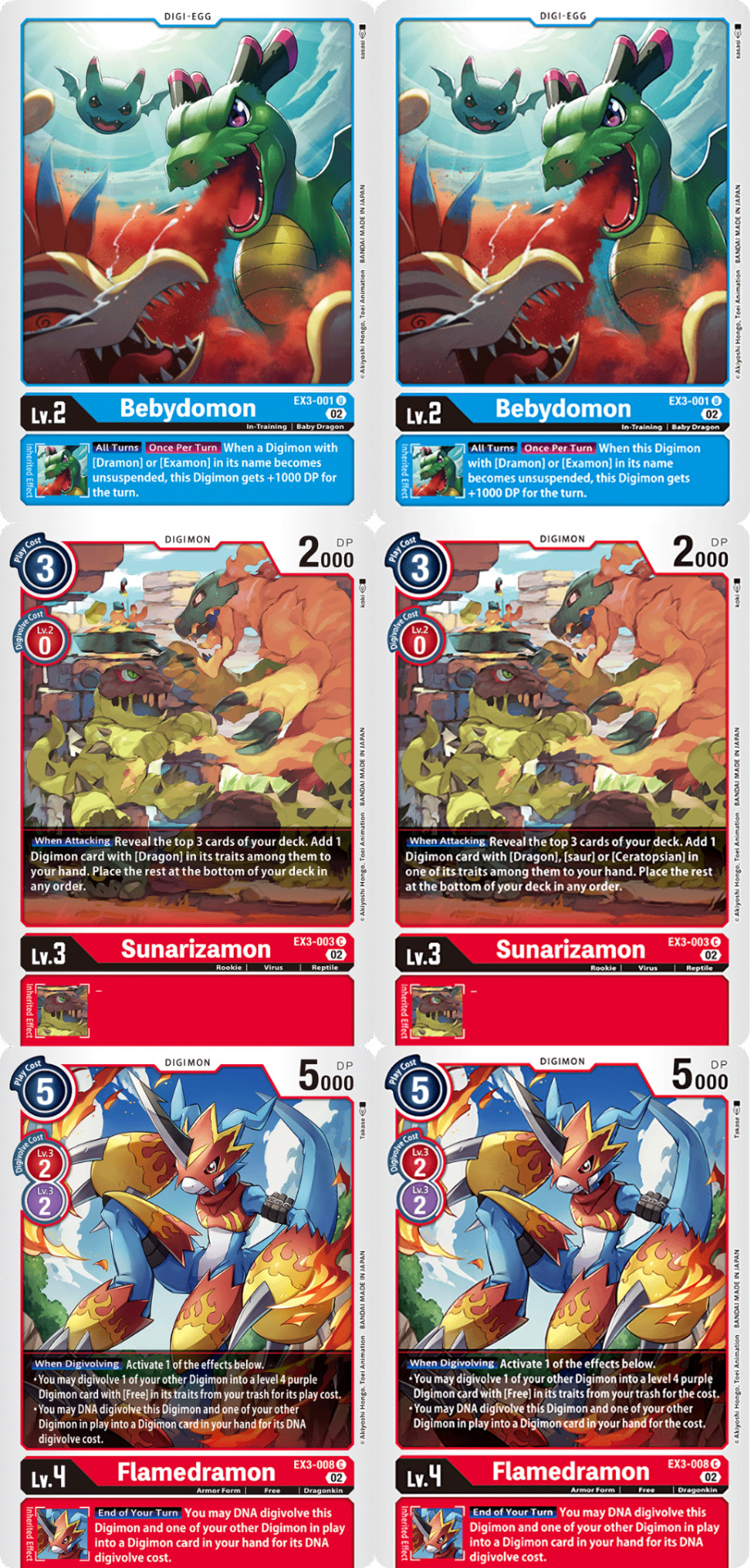
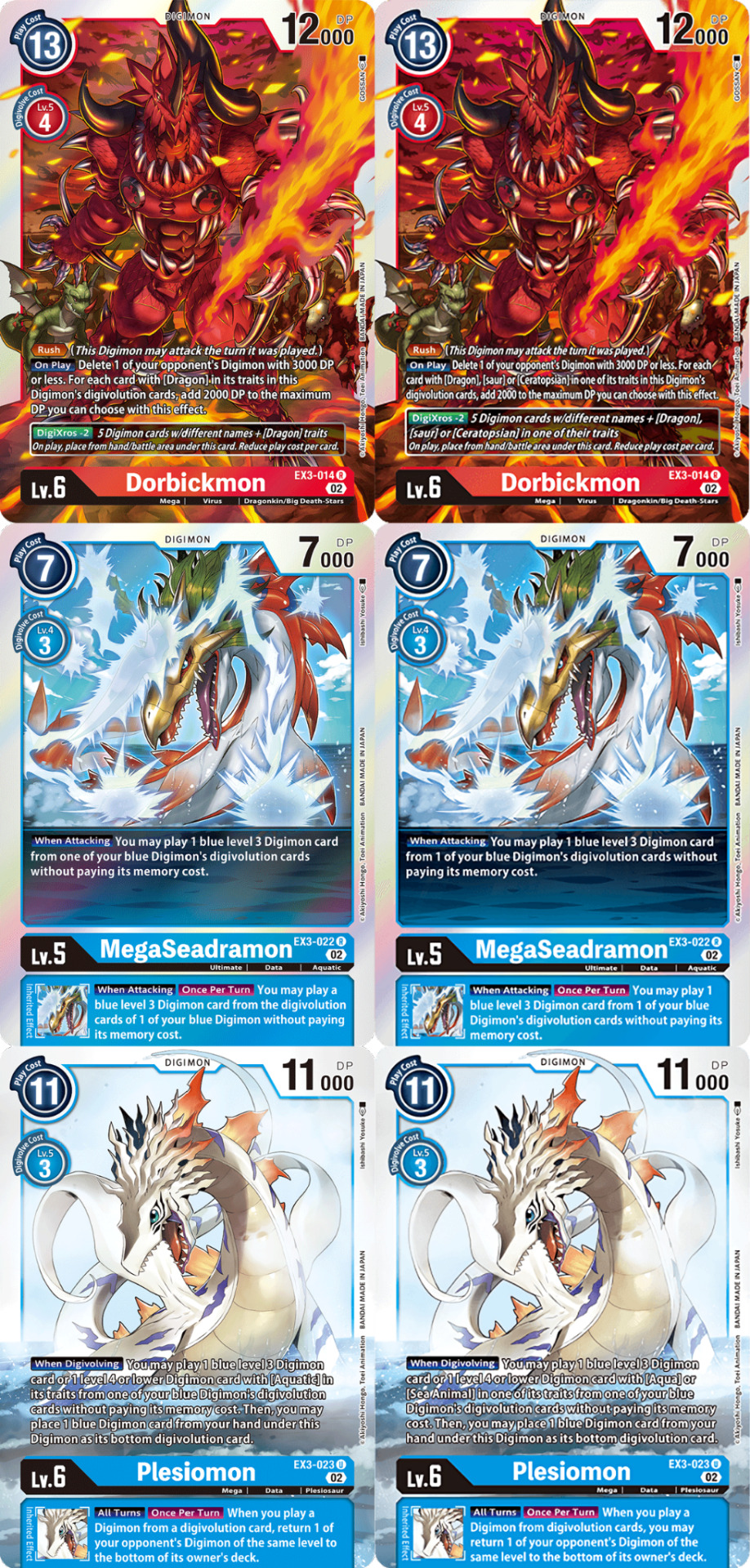
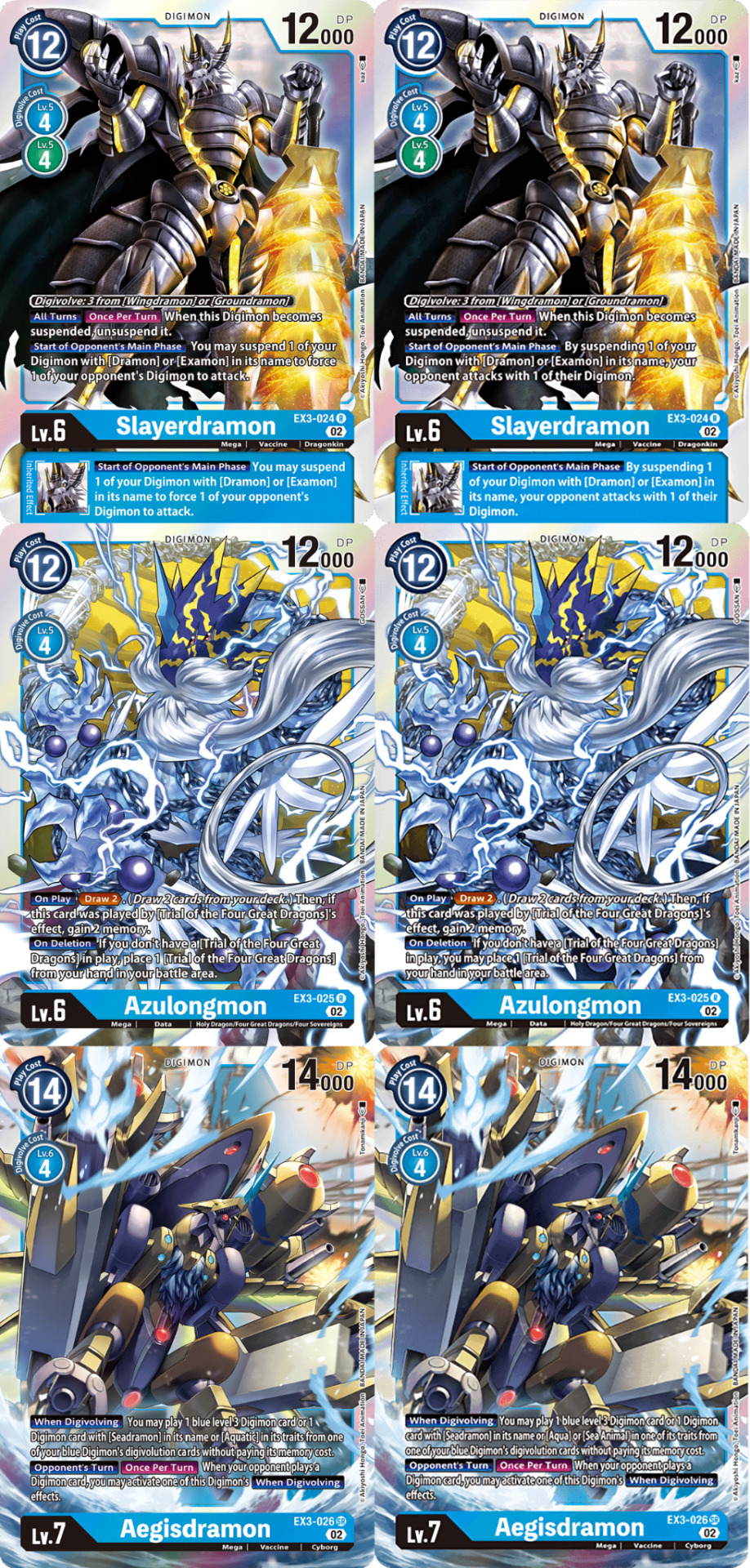


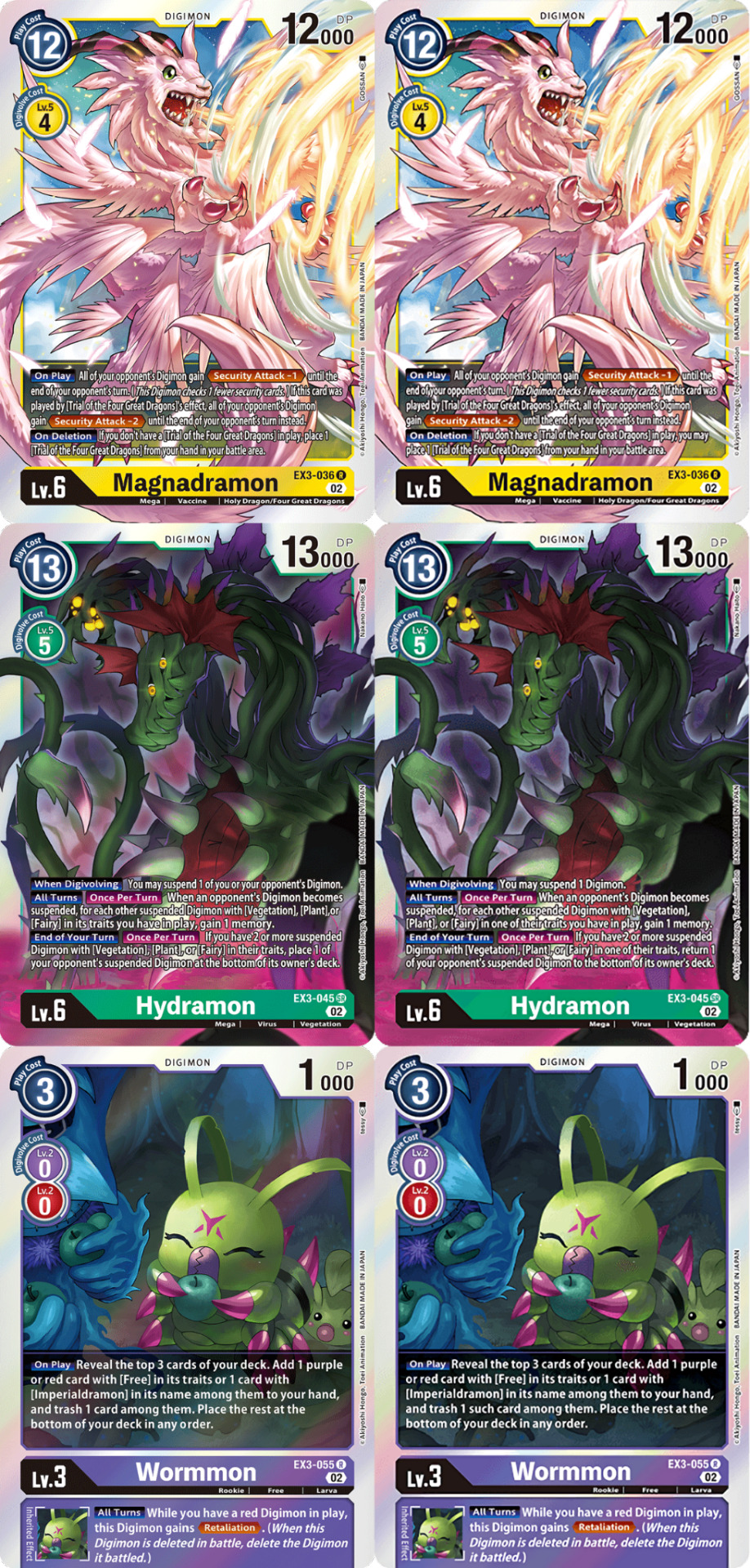

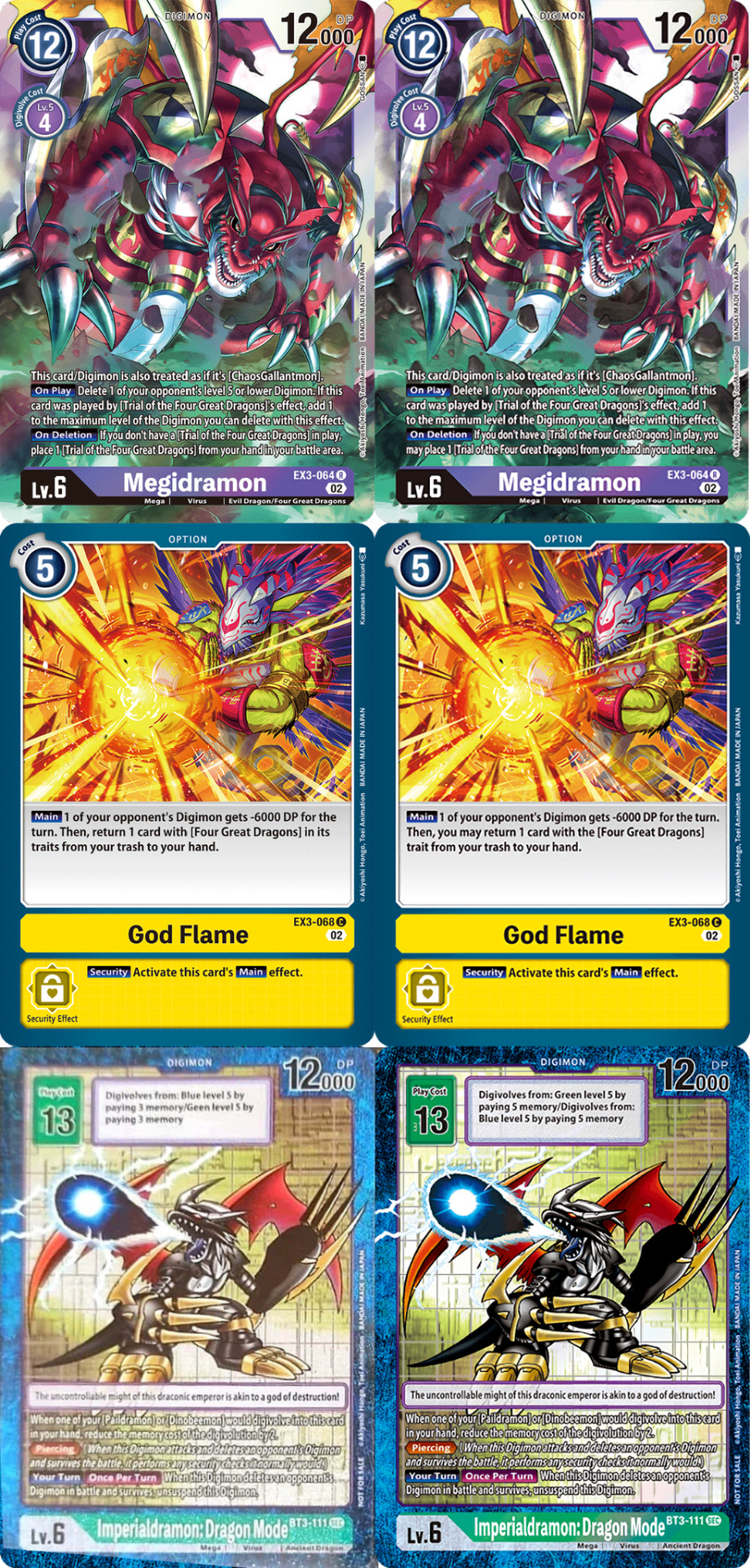
You can read all of the Errata on the official website under "rules"
24 / 74 cards got Errata. Thats one third of the set.
There will be no reprints (as always)
Some Errata are seriously bad, some are just worded differently.
They also made several mistakes on the Errata page itself:
Bebydomon is incorrectly spelled as Babydomon
Slayerdramon's Effect is pasted in double
Hydramon's Normal Art and Alt Art cards are switched up
God Flame's card code is incorrectly listed as BT10-068
#digimon#digimon card game#digimon tcg#digimon tcg news#digica#digisafe#デジカ#errata#translation notes#draconic roar
29 notes
·
View notes
Text
Basic Words (Hiragana) 1
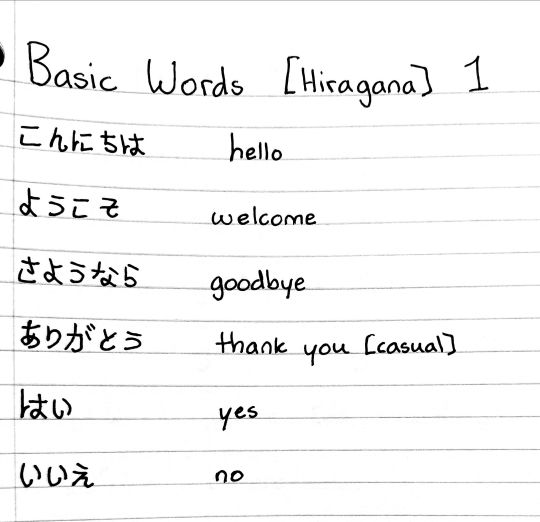
#langblr#japanese#japanese langblr#language#japanese language#hiragana#hiragana notes#translation notes
10 notes
·
View notes
Text
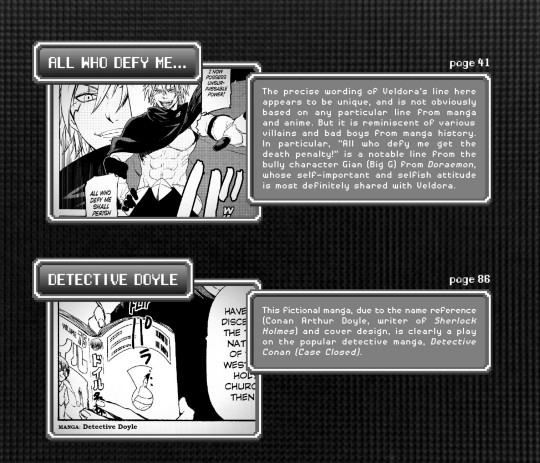


#That Time I Got Reincarnated as a Slime#Taiki Kawakami#manga#Translation Notes#mangacap#Veldora Tempest#Doraemon#Gian#Big G#Case Closed#Detective Conan#The Kindaichi Case Files#Hajime Kindaichi#Dragon Ball Z
26 notes
·
View notes
Text
Lies webcomic + quick translation note
absolutely fantastic webcomic with Carlo+Romeo!!
It's in Korean so if you can't read it I can just tell you that the majority of the text is just the korean version of the sand memories section from the game.

but anyways because of this comic I suddenly noticed a line (from the panel above) that was "lost in translation". After much much thought, I don't think this line is the big deal I thought it was, but I might as well share here.
There's an extra line from the black shore scene that that is omitted in the english version (because it's not something you say in english:)
There is no language without culture
In the english version where Romeo and Carlo meet for the first time in the sand memories, Romeo tells Carlo to "call him lampwick" -
Hi! Are you training to be a stalker too? Let's practice together! Call me Lampwick!
In the korean version:
안녕, 너도 스토커 지망생이야? 나랑 연습하자! 남들처럼 편하게 불러, 램프윅이라고!
So, The "extra line" that was omitted in the english release is: 남들처럼 편하게 불러, which I would translate to "Call me comfortably like the others do" (lit).
I think it's very likely that Carlo and Romeo are the same age, but generally in korean you can use something like "call me comfortably" or "speak comfortably" with someone younger than you, it's basically giving them permission to speak informally with them or use their name. Here Romeo is saying something like "Everyone calls me lampwick!" :)
There's other interpretations I could give for 남들처럼 편하게 불러 , but I don't think they're that accurate. Other scenarios are that:
Carlo is younger than Romeo
Carlo was enrolled at a younger age than his peers (??), which is why Romeo says Call me comfortably like the others ? (could be completely wrong)
Initially I thought that it might tell us that Lampwick was older than Carlo, but now I think that's just what you say when meeting each other for the first time even when you are the same age, so it is essentially just "Call me Lampwick" but in Korean (even though that can have different implications in the korean language).
This is really complicated and I also can't really wrap my head around it, but hopefully this was interesting at least :)
#translation notes#lies of p#lop#lies of p spoilers#comic#edit: update link cuz the embed was kinda weird for some reason
49 notes
·
View notes
Text
1-5 Translation Notes | HANDPLATES
Polish is a very gendered language. You add specific gendered additions no matter in which person you’re speaking. If you’re talking about someone or something, you specify their pronouns. So this is a bit of a problem with frisk. They’re non binary. They use they/them. In polish we have two ways to describe gender neutrality. They’re both uncommon, because, well, Poland isn’t the most accepting of places. Anyways.
The two ways are:
Talking about frisk as if they’re two people. This is the more accepted way, since it sounds like old polish, in which you very often used plural pronouns for one person. Sadly, those pronouns can’t really be properly used in the first person, unless the person wants to sound like they have DiD.
The second way is less accepted, and sounds foreign because of how little it’s used. But most non binary people, along with myself kind of, prefer that way of speaking. It basically means using the natural pronouns, which is cool, we have that. Sadly, they have an „OM” sound instead of a softer „AM” or „EM” so it stands out in day to day speech. I opted for this way of doing so, since it would be more fun and specifically point out them being non binary. Especially since frisk is a child, and child is one of those few gender neutral words even in polish, so even if someone wanted to be mad, they wouldn't be able to.
*which isn’t always the case, mind you, since words in polish are very often gendered like for example, person, is feminine *
During hole punching the only thing I’d want to mention is that I forgot one line, at first. The „It’s only five seconds”. I only found the mistake after showing it to a friend of mine and counting the paragraphs ^^””
In polish, it’s not all that common to call anyone ”Doctor” or "Professor" even if that’s who they are/their title. More common is calling them sir/mr or ma’am/miss. This fun little thing stems from back in time, Medival times, i think. Basically, the nobles decided that, yes, they were descendants of some great warriors, so they’re all lords/sirs. They started to call themselves Sir/Ma'am etc all the time. they didn't stop, so it continued into today's speech. For example.
English:
Mr president! What do you think about your campaign?
Polish:
Panie prezydencie! Co pan myśli o Paniskiej Kampanii?
Translated (literally):
Mr president? What do you*Mr think about your*Mr Campain?
So that’s…fun. And it’s the reason why the first time alphys calls Gaster „Mr Gaster” and only later switches to „Doctor Gaster”. Because calling someone Mr in polish feels more...respectful? Than calling them doctor. Since the Mr is directly addressing someone as your superior, your elder. and it just makes sense that alphys would make a "Mistake" like this.
Another thing about alphys is that she often uses „umm”. In polish, we would more often say „eeee” „Yyyyyy” „Mmmmmm” or just straight up „Emmmm” since that’s just how we speak.
In the fourth one, I had some issues because of the scientific language that didn’t translate well. But that’s honestly not that interesting.
The fifth one also wasn’t all that interesting in terms of the translations.
#handplates#wd gaster#alphys#comic translation#translation#translation notes#sans#papyrus#ut frisk#non-binary#gender-neutral language#language talk#language#polish#damn i was tired when i wrote this#polishplates#english translation notes
13 notes
·
View notes
Text
I'm not on the bird app so I have no idea what's going on there but from what I've been seeing via fandom posts on tumblr these past few days, it's kind of a mess.
I have no desire to be dragged into discourse so I'm not adding the main fandom tags to this post but I just want to say:
the Japanese language has a lot of ambiguity
translations are never going to be perfect because some things are impossible to translate and each translation is filtered through another person's interpretation
blindly criticizing something without understanding the cultural and linguistic context is just willful ignorance
it's fine to have personal opinions about a piece of media in regards to the story, characters, and how they're presented. healthy discussion is good and everyone should be allowed to speak their mind without being attacked by others in fandom.
authors don't owe their readers anything beyond basic human decency. the story is theirs to tell in whatever way they choose. they are human too. they deserve kindness and respect (and rest).
personal attacks and criticisms where the creator is going to see them are never okay
#for the record all the people i follow are respectful in their (very valid) criticisms#but some of the things i've been seeing were so infuriating that i just had to vent#i came on this hellsite to relax (wtf was i thinking?)#dancing girl rambles#dancing girl's bnha thoughts#translation notes
1 note
·
View note
Link
This has been something I’ve been turning over in my head for a long time now, but after several months of consideration and consultation with others, I’ve decided to translate 純真の紋章 (“junshin no monshou“) as “Crest of Sincerity” and “誠実の紋章” (“seijitsu no monshou“) as “Crest of Integrity” going forward, and I also plan to retroactively update most of my past translations to reflect this. Those who have followed my translations may know that I’d been using the translation “Purity” for 純真 (“junshin“) and “Honesty” for “誠実” (“seijitsu“) up until now. On top of explaining my justification for the changes, I thought I also might as well take the opportunity to write about Adventure and Adventure 02‘s Crest names in translation.
#Digimon#Digimon Adventure#Digimon Adventure 02#Digimon Adventure LAST EVOLUTION Kizuna#Translation Notes
10 notes
·
View notes
Text
I don't know who might need this information, but Nightfall actually calls Twilight "Twilight senpai" or just "senpai" when they aren't under fake identities. That is probably to be expected, considering Twilight trained her and all, but it still caught me completely off guard.
#Twilight#Agent Twilight#senpai#in the English translation she called him her mentor a couple of times and the rest was just or#now i want to see that animated and voiced even more XD#Twilight being called is something i didn't know i needed XD#spy x family#sxf twilight#sxf nightfall#translation notes#spy x family manga#manga spoilers
17 notes
·
View notes